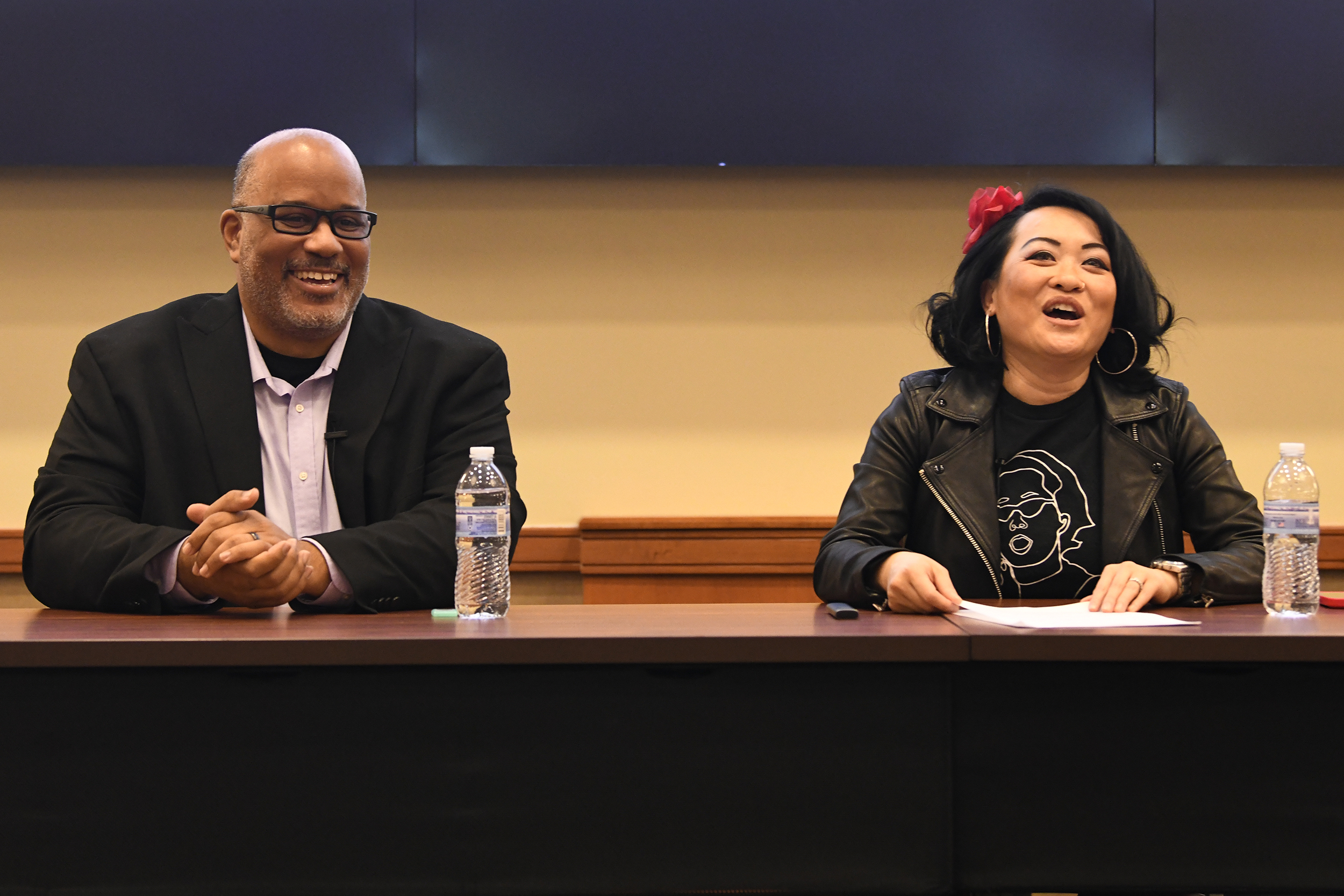LEAPS Speaker Series Explores ‘White Space’
February 21, 2024 Lou Cortina
Maryland Carey Law professor Russell McClain and two professors from College Park discuss equity in higher education and related topics at inaugural event.
Photo: Russell McClain, left, and Rossina Zamora Liu
Russell A. McClain, JD, was a first-year law school student in the early 1990s when he received a subtle reminder about perceptions of an African American student studying at a predominantly white institution.
Admitting that he wasn’t the greatest student through high school and college, McClain said he “killed the LSATs” and was thriving as a first-year student at what is now the University of Maryland Francis King Carey School of Law. After receiving excellent grades in his first semester, he said he was “riding the wave — it was great.”
“During the second semester, an administrator came up to me and said, ‘Why do you write so well?’ ” said McClain, who is now a professor and the associate dean for diversity and inclusion at Maryland Carey Law. “At the time, I took no offense to that statement. But in the decades since, I’ve been able to use a more critical lens to look at that experience and explore what’s implicit in the question — that I shouldn’t be able to write well. In other words, that maybe I shouldn’t fit in this ‘white space.’
“Another implicit aspect of it is that if I can write well, then maybe I don’t also fit into my own identity group,” he added. “So, of course, I’m never qualified to be white, but maybe I’m not even qualified to be Black and write exceptionally, like I’m a unicorn or something. And that kind of interaction has a real tendency to undermine a sense of belonging. Students, employees, and members of organizations are much more likely to thrive in a space where they feel that they belong.”
McClain was speaking at the University of Maryland, Baltimore’s (UMB) Leaders in Education: Academy of Presidential Scholars’ (LEAPS) inaugural Speaker Series event on Jan. 31, titled “White Space: A Critical Race Examination of Equity in Higher Education.” McClain moderated the event at the SMC Campus Center and was joined by two professors from the University of Maryland, College Park (UMCP), William Ming Liu, PhD, and Rossina Zamora Liu, PhD, MFA.
McClain, whose scholarly interest is in the environmental factors that affect academic performance including stereotype threat and implicit bias, and the two UMCP guests talked about their experiences with and observations on systemic racism, white supremacy, anti-Blackness, racial capitalism, and topics related to the work of equity, diversity, and inclusion in higher education.
William Ming Liu, professor and chair of the Department of Counseling, Higher Education, and Special Education in the College of Education at UMCP, talked about a social experiment he conducted during his time at the University of Iowa. He decided that when walking on the sidewalk from his building to the parking garage, he would “stay in his lane” and not move over when three or four white people were walking the other way, as he had previously done.
“These people, mostly white men, would glance at me and I would glance at them, and quite literally we would end up inches away from each other, almost chest to chest,” said Liu, an Asian American whose scholarly interests include social class and classism, men and masculinity, and white supremacy and privilege. “They weren’t necessarily startled, but they were a little shocked. And the way I interpreted part of that shock was that they were frustrated because I didn’t get out of the way.
“I started to think, what was this interaction? Was this a kind of racism I was experiencing? … It struck me that out in this public space, the people didn’t see me as a professor or the chair of a department. Once I pushed open the double doors of my building and got out into the public space, the privileges I had due to my academic titles were shed away, and there was no portability of those privileges.”
Rossina Zamora Liu is an assistant professor in the Department of Teaching and Learning, Policy and Leadership in the College of Education at UMCP, and the focus of her scholarship includes antiracist, racial, and social justice education, systems of white supremacy, and anti-Blackness in education. An Asian American, she discussed her frustrations with serving on a search committee, questioning the process of ranking a minority candidate vs. two white candidates for the job, and challenging the process’ status quo to white colleagues who told her, “That’s just the way things are.”
“Nothing explicitly racist happened in this deliberation, and yet it felt incredibly racist to me,” she said.
She also reminded the UMB audience that “race is involved in everything. And as a woman of color, my lived experiences have taught me that racism can and does occur even in the absence of explicit racist acts. And as a faculty of color, I also know that even the most overt and explicit occurrences can and often do go unchallenged, particularly at white institutions.
“For us as critical race scholars of color whose work interrogates systemic racism, equity policies and practices must center the experiences of those who are directly affected by systemic racism,” she added. “This means that rather than creating programs to fit faculty, students, and staff of color into white institutions, we must restructure the institutions themselves to fit the needs and wants of faculty, students, and staff of color. It means that we must be clear and explicit about what we mean by equity. At the baseline, it means that we must insist that there is no equity without racial equity.”
After their speaking turns, the professors fielded questions and then wrapped up the event with a 30-minute period for networking and refreshments. You can watch the inaugural LEAPS Speaker Series event in its entirety below or at this link.